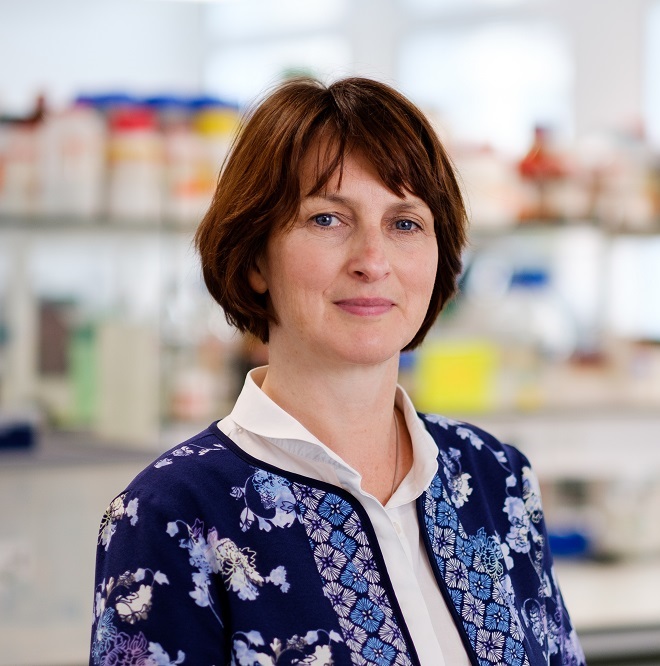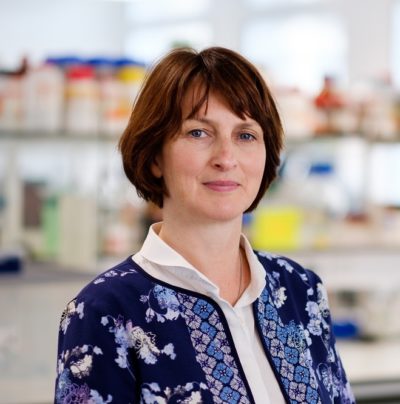

Meet Professor Eithne Costello
For International Day of Women in Science, Professor Eithne Costello gives us an insight into what life as a researcher is like.
Professor Eithne Costello is an important and established member of the pancreatic cancer research community. She gives us an insight into what life as a researcher is like and provides advice and encouragement to ambitious women who are thinking about starting a career in science.
My journey as a researcher started with getting a B.Sc. and PhD in Pharmacology at the University College Dublin in Ireland before moving on to do my post-doctoral training in Switzerland. I have worked at the University of Liverpool since 1999, where I head my own research group with a focus on biomarker development for pancreatic cancer diagnosis. I have been working with Pancreatic Cancer UK for a number of years now and I was a member of the Charity’s Scientific Advisory Board from 2013 until earlier this year. I was also funded through their Research Innovation Fund in 2015.
Why did you become a researcher?
I always enjoyed science at school, although I had no real idea then what being a research scientist actually meant. The training takes a long time if you include the degree, PhD and then post-doctoral training. It can be very tough at times, but it’s never dull. The process of systematically undertaking experiments, gathering data and trying to piece the evidence together, until the research question begins to yield some answers is always exciting. These days, my team do the hands-on data gathering, but I still have the joy of working with them trying to interpret our findings. Most of the time, we end up with new questions, but we are always making progress, which is key.
How did you start working in pancreatic cancer research?
I started working on pancreatic cancer research when I joined the University of Liverpool, which was over two decades ago now. I remember being astonished to learn of the poor prognosis associated with the disease. Things are improving, but we need to do more.
We’re just about to open a large Cancer Research UK Funded-study called UK-Early Detection Initiative (UK-EDI), which will explore the link between diabetes and pancreatic cancer. We will recruit 2,500 people over 50 years old who have received a new diagnosis of diabetes within the last 6 months. In just under 1% of individuals newly diagnosed with diabetes, the diabetes is secondary to pancreatic cancer and these individuals are at risk of being diagnosed with pancreatic cancer within 3 years. Currently, there is no way of distinguishing pancreatic cancer-associated diabetes from the much more common type 2 diabetes. We will collect samples and questionnaire data from recruits in order to devise strategies to detect pancreatic cancer in people newly diagnosed with diabetes in the future. Since more than half of pancreatic cancer patients have pancreatic cancer-associated diabetes, using diabetes as an early warning sign should allow early detection of a significant proportion of pancreatic cancer cases. Early detection will mean better outcomes for patients, allowing them to undergo treatment earlier and potentially survive longer and that is what we are working towards.
What challenges have you faced as a woman in science and how did you overcome them?
As women, we still have a considerable journey to travel, however, I think that gender bias and gender stereotypes will begin to shift as more women take up leadership roles in science. Role models are hugely important and increased visibility for women is crucial. Role models not only inspire future generations of women, they also show male and female peers that having women in leadership roles is not risky, but rather benefits the organisation as a whole. I have seen improvements in the number of women on scientific advisory boards, grant funding panels and conference organising groups in the past decade. However, there are still times when women are vastly outnumbered by men, and this can’t be a good basis for representative decision-making.
What has been your greatest highlight as a researcher?
Working with talented people, both locally and in national and international teams is a privilege. In the field of pancreatic cancer, I collaborate with many researchers. While we take different approaches, we share a common goal of seeking to understand better how to detect pancreatic cancer earlier and how to treat it more effectively. Interacting with patient groups and charities has also been very rewarding. I’m always staggered by the great work that is being done.
What advice would you give to female undergraduates and early career researchers who want to go into academia?
I would say, try it and if you think it is for you, then go for it. You will have to work hard, but that has never stopped you before. Women often hold themselves to very high standards, worrying that they are not qualified or experienced enough to go for promotion, only to find that a male colleague with the same levels of qualification or experience has secured the job. Have confidence in yourself and follow you heart. Academia needs gifted hardworking people who want to make the world a better place.